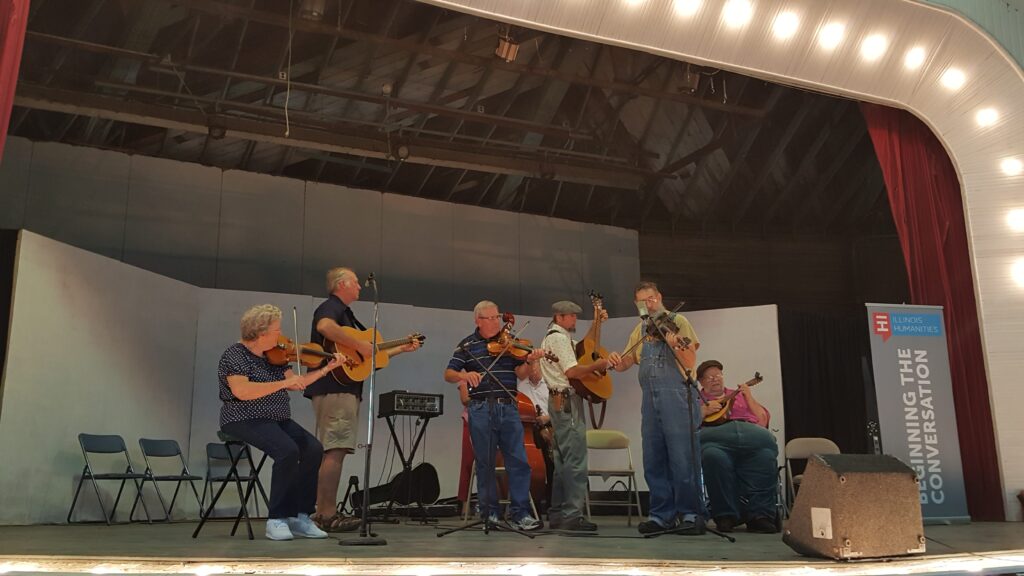 Illinois Humanities was honored and excited to visit the communities of Shelbyville, Greenville, and Cobden, IL for the touring series “Seeding Change? The Future of our Farms and Communities,” this August. Simon King, who grew up on a farm in rural Michigan and served as the first director of the Carnegie Mellon University Design Center, joined regional farmers and agriculture experts at each stop for a series of lively conversations on the relationship between recent technological developments in agriculture and the economic and cultural future of farming communities.
Illinois Humanities was honored and excited to visit the communities of Shelbyville, Greenville, and Cobden, IL for the touring series “Seeding Change? The Future of our Farms and Communities,” this August. Simon King, who grew up on a farm in rural Michigan and served as the first director of the Carnegie Mellon University Design Center, joined regional farmers and agriculture experts at each stop for a series of lively conversations on the relationship between recent technological developments in agriculture and the economic and cultural future of farming communities.
We especially enjoyed bringing people together by highlighting the cultural and agricultural
resources of their region: each event included a meal featuring locally produced ingredients and a musical performance.
Learning from communities and incorporating their perspectives into our work is central to Illinois Humanities’ mission. In addition to our generous partner organizations and thoughtful speakers, we’re extremely grateful to all those who attended and  shared their perspectives, and we’ve collected some highlights from audience members’ responses to the events below. For those who weren’t able to attend or would like to revisit the discussion, please check out the audio from Greenville and Shelbyville, and the video from Cobden.
shared their perspectives, and we’ve collected some highlights from audience members’ responses to the events below. For those who weren’t able to attend or would like to revisit the discussion, please check out the audio from Greenville and Shelbyville, and the video from Cobden.
At the end of this blog post, we’ve included more information about some ways that Illinois Humanities can continue to serve your communities. We greatly enjoyed and appreciated this unique opportunity to experience some of the rich cultural landscape of rural Illinois, and we hope that these events will provide starting points for conversations that continue long after the final harvest of the fall.
Comments have been edited for style and clarity.
- “I’m really interested in seeing more young people come back to rural areas and possibly start small crop farms and farmer micro-hubs… Is that going to be too difficult with current agricultural policy?”
- “How do you suggest the younger generations start to find ways to change the current state of agriculture/agribusiness? Vote with our wallets? Be active in what policies are being passed? Support local farmers?”
- “It would be helpful to make a clear distinction between commodity farmers & specialty crop growers. Each method is very different with very different sets of challenges. In this session, both groups were lumped together as if they were similar.”
- “We must be careful of trends that don’t replenish community good. How do changes in agriculture affect community health?”
- “Pollinators have been a recent hot-topic issue in a number of circles, i.e., agriculture, ecological, garden clubs, school groups, etc. How does large-scale ‘clean’ agriculture make considerations for pollinators? It seems like a community discussion about pollinators that brings a lot of these key players together to discuss the issues of pollinator decline would be worthwhile. Pollinators have an amazing way of bringing a lot of different perspectives together!”
- “I wish more younger farmers had been here, like my son… I wish we could get something like [Farm Hack programs] started around here for younger farmers.”

Thank you to all those who came and participated in “Seeding Change”! As a statewide organization that supports Illinois’ cultural vibrancy, we have several programs that travel the state.
Our Road Scholars Speakers Bureau provides low-cost presentations on a wide range of topics and is perfect for community organizations or museums – check out the new roster that starts in November!
Illinois Speaks, a new series, supports community-driven small-group conversations. We provide facilitation training and monetary support. Groups can meet monthly or can host one-time gatherings through a micro-grants program. We’re trying to have an Illinois Speaks conversation in each of Illinois’ 102 counties by our state’s bicentennial and we’d love your help.
Capitol Forum is a year-long civic education program for Illinois high school students promoting informed discussion about and active participation in human-rights policy issues. This program is open to teachers and helps fulfill the new civic education teaching requirement.
We’re also hoping to hear from YOU about what types of programs or topics you’d like to see in your community – please send a note to info@ilhumanities.org.